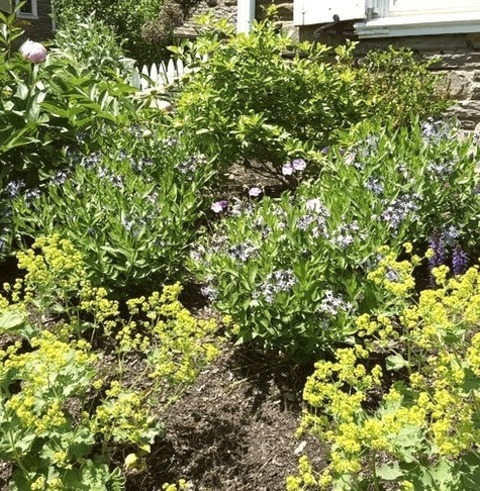Pollinators - Tumblr Posts - Page 2
All the more reason to support local bees.
got my hands on a field guide of californian bugs and i found that there's this one bee species in southern california that looks like this
![[id: a drawing of xylocopa varpuncta, aka the valley carpenter bee. the drawing portrays a female and male of the species respectively
the female is pitch black, she has huge eyes and sketchily drawn antennae on her head. she has blue-purple lighting on the side of her face to bring out the details. Under her is white text surrounded by a black box that reads, "FEMALE".
The male is drawn in a far more simplified and cartoonish way. He is yellow and has a lighter sand color "mane" around his neck. he has huge, green eyes with beady pupils. he has rounded antennae. below him is text that reads, "male". end id]](https://64.media.tumblr.com/f1014b9292a7dd5e95fb21b9a36288a2/a63d91e5d2a95aac-9d/s500x750/50d3c5f364f0d7cf4999cf4c63929b23ef63ff7a.png)
(Actual bugs under the cut, CW for insects)



Taken back in either late summer or early autumn of 2015. Honestly, #bumblebees just look so cute and cuddly. Since I can't pet them I just take pictures of them. #Chicago #pollinators #flowers #photography (at Chicago, Illinois) https://www.instagram.com/p/CLFMHsNlfIz/?igshid=15bxynv13h57w

Taken back in late spring of 2016. Now, take a close look. You see that dark thing in the rose? That's a #bumblebee who tucked themselves into that rose. 🌹🐝 #photography #pollinators #roses #Chicago #chicagobasedartist (at Chicago, Illinois) https://www.instagram.com/p/CLSTvbDBWCU/?igshid=s7cv4ex4a8ck

Taken in the summer of 2017. I might try to draw this one... 🤔 #Chicago #photography #pollinators #butterflies (at Chicago, Illinois) https://www.instagram.com/p/CMDAjkLh2rG/?igshid=fzycft0p51rh

This photo was taken in the summer of 2017. What #butterfly do you think this one is? #pollinators #photography #Chicago #nature (at Peggy Notebaert Nature Museum) https://www.instagram.com/p/CMScMJUh8D1/?igshid=lfk1jlsrpzst

Gravel Front Yard in Austin Summertime inspiration for a sizable, contemporary, gravel front yard walkway that can withstand drought.
Modern Landscape in Austin

Inspiration for a large modern drought-tolerant and full sun front yard gravel walkway in summer.
Moth Fact: Moths are sometimes pollinators! In fact Yucca plants have their own moth that they rely on to pollinate. These moths have “tentacles” to gather pollen with; these tentacles replace the long tongue most moths/butterflies have. Yucca moths vary on the exact species on yucca plant as well. These beautiful white moths tend to be very small with wingspans never going past 33 mm.



Front Yard in Orlando Photo of a small contemporary drought-tolerant and full sun front yard mulch and wood fence garden path in spring.

Transitional Landscape Photo of a mid-sized transitional full sun front yard stone landscaping in spring.

"Next Monday [6/17/24] is the start of National Pollinator Awareness Week, and one Colorado advocacy group is hosting a flower planting drive to rewild Colorado’s meadows, gardens, and just maybe, its children too.
Created by constitutional amendment in 1992, Great Outdoors Colorado (GOCO) is a state-funded independent board that invests a portion of Colorado Lottery proceeds to help preserve and enhance the state’s parks, trails, wildlife, rivers, and open spaces.
This year, GOCO’s offshoot Generation Wild is distributing over 100,000 free packets of wildflower seeds to collection points at museums, Denver Parks and Rec. offices, and libraries all over the state to encourage kids and families to plant the seeds in their backyards.
The Save the Bees! initiative aims to make the state more beautiful, more ecologically diverse, and more friendly to pollinators.
According to a new report from the Colorado Department of Natural Resources, 20% of Colorado’s bumblebees are now at risk of extinction. Even in a small area like a backyard, planting wildflowers can make a positive impact on the local ecosystem and provide native bees with a healthy place to live.
“The Western Bumblebee population has declined in Colorado by 72%, and we’re calling on kids across Colorado to ‘bee’ the change,” said GOCO Executive Director Jackie Miller.

Named after Generation Wild’s official mascot “Wilder,” the Wilderflower Seed Mix was developed in partnership with Applewood Seed Co. and packets are now available for pickup at designated partner sites including more than 80 Little Free Library boxes.
By distributing 100,000 Wilderflower packets, Generation Wild is providing more than 56 million seeds for planting in every nook and cranny of the state. All seeds are regionally-native to Colorado, which is important for sustaining the living landscape of bees, birds, and other animals.
Additionally, by using flower species adapted to the Mile High climate, landscapers and gardeners need to use less water than if they were tending non-native plants.
“Applewood Seed Co. was excited to jump in and help Generation Wild identify a seed mix that is native to the Colorado region and the American West, containing a diversity of flower species to attract and support Colorado’s pollinator populations,” stated Norm Poppe, CEO of Applewood Seed Co. “We hope efforts like this continue to educate the public on pollinator conservation and the need to protect our native bees and butterflies.”
Concluding her statement Miller firmly stated that children grow up better outside, and if you or a parent you know agree with her, all the information on how to participate in Save the Bees! can be found here on their website, including a map showing all the local pickup points for the Wilderflower Seed Packets."
-via Good News Network, June 13, 2024

Blue Vervain
Verbena hastata
With a tiny green sweat bee feeding on its flowers.
This plant was growing in a wetland along the Meramec River and is native to a large portion of North America.
July 26th, 2023
Arnold, Jefferson County, Missouri, USA
Olivia R. Myers
@oliviarosaline
Who KNEW!?
So I just had found out that Bumble bee have five eyes. Thats fucking crazy!
So like I start most of my mornings. I wake up to the the blaring sound of my phone alarm. Which I do believe adds to my stress of not being my full self. Oh how I miss not having any responsibilities. I wish I could share the boat load of things with a person who loves me.
I phrase my statement this way because there are so many people who fake being in love. i just rather have people love me way more than I love them.
I'm a good guy, but not a nice person. And no! I will not elaborate nore explain. It takes so much from me being responsible. I fucking hate it. But! When I'm not in a leadership position or have anything to do. I feel as if I'm supposed to be doing something. I feel so weird about it.

Any who, I happen to wake up because of my alarm and wanted to paint something. I have a tattoo that I'm getting on the 6th of this month. it's gonna be pretty. I'm having flowers and all sorts of pretty things. I'm getting a garden on my arm. So one of the things a garden has are insects. Wiyh all of thi being said. I was watching garden videos so I could get a better idea of what should be in my tattoo.
and boom! I see this awesome garden video and the gardener, zoom into a close up of the bee. and I was like ughhhh!!! What the fuck! Is tat a mutant bee? and nope! Its a normal bee. They do not just have two really big eyes, they also have 3 tiny ones.

This makes me sad because, now, when I look at them. They look like spiders. And in my head spiders look FUCKIN ugly. and now I have these crazy ass looking creatures on my arm. It's a fucking lie, A lie I tell you. A lie, I just wanted to vent about how all my life, I have loved these creatures... and they, they..... they look nothing like how I thought them to be. I mourn fo my memories.
Milkweeds (Asclepias spp.) are the required host plants for caterpillars of the monarch butterfly and thus play a critical role in the monarch’s life cycle. The loss of milkweed plants in the monarch’s spring and summer breeding areas across the United States is believed to be a significant factor contributing to the reduced number of monarchs recorded in overwintering sites in California and Mexico. Agricultural intensification, development of rural lands, and the use of mowing and herbicides to control roadside vegetation have all reduced the abundance of milkweeds in the landscape.

Colors ~ Brown and White
